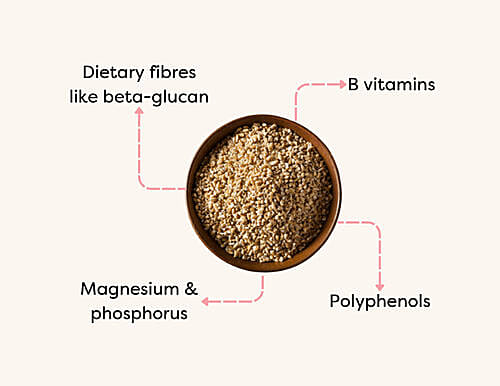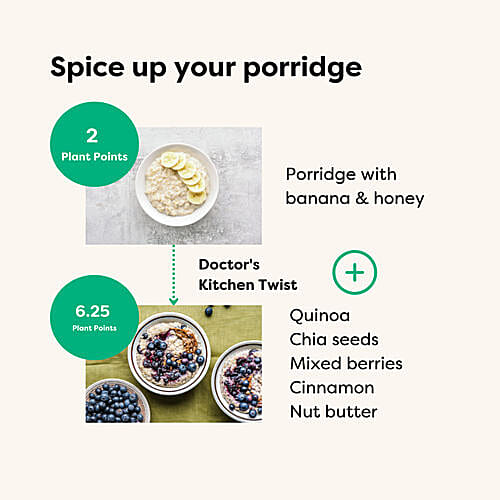Oats: Are they a healthy breakfast?
15th May 2024
Oats can be controversial: some swear by them as the ultimate breakfast, while others worry about glucose spikes. We're somewhere in the middle: oats add to your intake of whole grains and provide beneficial compounds, but how you eat them matters.
Key points
Health benefits of oats
As part of a varied diet, eating oats is tied to:
- Improved cholesterol levels: Trials show that adding oats to people’s diets reduced blood cholesterol levels.
- A lower risk of heart disease: Observational studies show that those who eat more whole grains – including oats, brown rice, rye, barley and bulgur – have a 21% reduced risk of heart disease.
- Better gut health: There is also growing evidence suggesting that oats may increase beneficial gut bacteria and metabolites, such as short-chain fatty acids.
Source of
- Vitamins and minerals, particularly B vitamins, magnesium and phosphorus.
- Polyphenols like phenolic acids and avenanthramides.
- Soluble fibres, like β-glucans. They can slow down the absorption of carbohydrates and help stabilise blood sugar levels after a meal.

What about glucose ‘spikes’?
The effect of oats on blood glucose levels can depend on a few things:
- Your biology: Pay attention to your cues and see what works best for you.
- What you would eat instead: Compared to refined grains like white bread, pastries or cereals, oats improve blood sugar levels but they may not match up to other foods higher in protein and fibre.
- What you eat them with: Oats alone are high in starch but pairing them with foods rich in protein, fibre and healthy fats helps slow down the breakdown of carbohydrates, reducing the blood sugar response.
- The type of oats: Research finds that thicker, less processed oats tend to be better for glucose and insulin responses compared to thin, instant types. That’s because overly processing oats disrupts the structural integrity of the oat kernel, which makes the starch more accessible to digestion.
Which type of oats is the healthiest?
All oat products start as whole oat kernels that have had their tough outer shells removed. They are processed in different ways to give the products you find in the shop. On a spectrum from least to most processed, you have:
- Whole oat groats – intact oat kernels without the outer shell.
- Coarser oats like steel-cut, pinhead or Irish oats – roughly chopped into small pieces.
- Scottish oats – milled into broken bits of varying sizes.
- Rolled oats or old-fashioned oats – steamed and flattened with rollers to create flakes with a softer texture and shorter cooking time.
- Instant or quick oats – steamed for longer and rolled even flatter to shorten the cooking time. They also sometimes have added sugar and flavourings.
Our tips for healthier oats
- Choose coarse whole oats like steel-cut, pinhead, Irish or Scottish oats rather than instant/quick types. You can soak them overnight to reduce cooking time in the morning or batch cook ahead of time.
- Add protein & fibre-rich toppings to make it more filling and help regulate blood sugar levels. Try yoghurt, egg whites, hemp, chia or flaxseeds, mixed nuts, a spoonful of nut butter and high-fibre fruits like berries, apples or kiwi.
- Mix it up with other whole grains like quinoa and millet.
- Sweeten with spices & fruits, rather than lots of sugar or honey. Try cinnamon or nutmeg, berries, diced apples, mashed bananas, citrus zest, coconut flakes, cacao nibs, etc.
- Try savoury porridge with water or stock, mushrooms, kale, mixed seeds and an egg.

References/sources
Health benefits: Llanaj et al. Eur J Nutr. 2022 | Ye et al. The Journal of nutrition. 2012 | Valido et al. The Journal of Nutrition. 2021
Compounds: Soycan et al. Food Chem X. 2019
Types of oats: Whole grain council| Harvard Health
Processing effect: Musa-Veloso et al. The Journal of nutrition. 2021 |Grundy et al. Food & function. 2018
- Access over 800 research backed recipes
- Personalise food for your unique health needs
